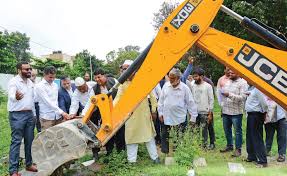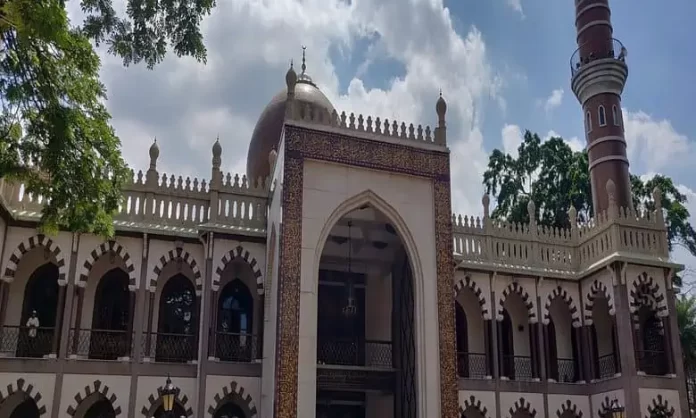– Mohammed Atherulla Shariff
Bengaluru, June 12: Masjid-e-Khadria, one of the most beautiful mosques here has initiated rainwater harvesting in its vast area. With a built-up area of 50,000 square feet that can accommodate 10,000 worshipers at a time, Khadria Masjid has a palm garden and fountains on its premises.
While hundreds of people visit the mosque on a daily basis, the amount of water that is wasted without being repurposed is undoubtedly quite enormous and calls for introspection.
The Masjid committee members and experts discussed projects such as rainwater harvesting, bore well recharge and water storage. The committee has come out with a comprehensive plan.
 Mohammed Sulaiman and Afzal Khadri, members of the trust board, announced the implementation of a comprehensive plan to conserve water with rain harvesting.
Mohammed Sulaiman and Afzal Khadri, members of the trust board, announced the implementation of a comprehensive plan to conserve water with rain harvesting.
“It is the responsibility of every citizen to safeguard our environment. We initiated this pilot project as part of a small effort to make up for the damages that we have done to the land in the name of development. We are also planning awareness campaigns so that more institutions adapt this system to store and reuse rainwater,” Afzal Khadri said.
One of the experts, Fauzan Majid, a city-based IT professional and environmentalist, said that the mosque and its infrastructure are built in such a way that the ground already collects millions of litres of rainwater.
The ways to store water and recycling were being thought of so that it could be reused at least for Wudhu (ablution). If all the mosques in the city adopt this system and reduce water consumption, the water scarcity problem can be overcome, he said.
Director of Water Institute and a professor in water resource engineering, Inayathulla M asserted that Bengaluru has gone from being the city of lakes to the city of concrete due to which water has disappeared.
Rainwater harvesting is one of the most effortless processes for saving and storing rainwater for future use. Utilizing this idea, we can reduce groundwater consumption for daily activities, helping us conserve it in times of water scarcity.




